 Petzlover
Petzlover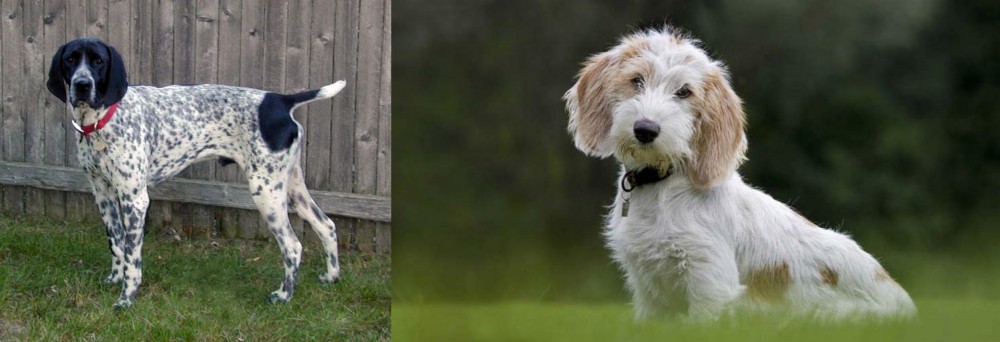 Both Braque d'Auvergne and Petit Basset Griffon Vendeen are originated from France. Braque d'Auvergne may grow 25 cm / 10 inches higher than Petit Basset Griffon Vendeen. Braque d'Auvergne may weigh 42 kg / 93 pounds more than Petit Basset Griffon Vendeen. Both Braque d'Auvergne and Petit Basset Griffon Vendeen has almost same life span. Braque d'Auvergne may have more litter size than Petit Basset Griffon Vendeen. Braque d'Auvergne requires Low Maintenance. But Petit Basset Griffon Vendeen requires Moderate Maintenance
Both Braque d'Auvergne and Petit Basset Griffon Vendeen are originated from France. Braque d'Auvergne may grow 25 cm / 10 inches higher than Petit Basset Griffon Vendeen. Braque d'Auvergne may weigh 42 kg / 93 pounds more than Petit Basset Griffon Vendeen. Both Braque d'Auvergne and Petit Basset Griffon Vendeen has almost same life span. Braque d'Auvergne may have more litter size than Petit Basset Griffon Vendeen. Braque d'Auvergne requires Low Maintenance. But Petit Basset Griffon Vendeen requires Moderate Maintenance
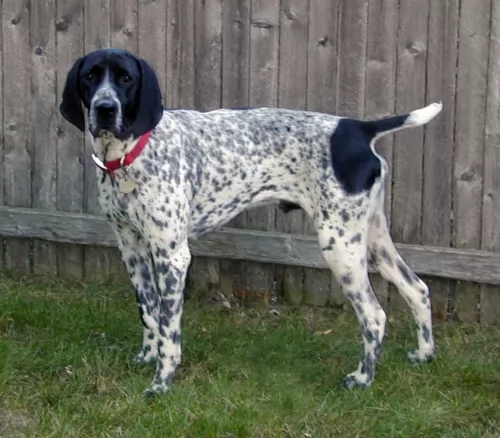 Sometime over 5 centuries ago, in the Cantal Region of France, was born a hunting breed, that might be the real ancestor of today’s pointing hunter dogs. Perhaps the oldest of all pointing gun dog is the Braque d’Auvergne. This breed comes from Central France in the region of Auvergne. This breed was developed prior to written dog breeding records in order to hunt in this region and find, point, flush out and retrieve fowl. This breed is clearly one of if not the oldest breeds in the French Braque. There is no agreement among historians on what breed is the oldest of the European pointing dogs and where they were developed – was it Spain or was it France? It is thought that the Braque Francais Gascogne is the original one of these in the early 1600’s while the Braque d’Auvergne came soon after. Due to the different hunting needs in the different parts of France, the Braque Francais Gascogne was crossed with a lot of other local scent hounds. The Braque d’Auvergne is one of the very oldest of all of these. There are records of the breeds existence in the 1700’s. It is probable that the Braque d’Auvergne was developed by crossing local dogs with Gascogne as well as with the Petit Bleu de Gascogne and the Grand Bleu de Gascogne.
Sometime over 5 centuries ago, in the Cantal Region of France, was born a hunting breed, that might be the real ancestor of today’s pointing hunter dogs. Perhaps the oldest of all pointing gun dog is the Braque d’Auvergne. This breed comes from Central France in the region of Auvergne. This breed was developed prior to written dog breeding records in order to hunt in this region and find, point, flush out and retrieve fowl. This breed is clearly one of if not the oldest breeds in the French Braque. There is no agreement among historians on what breed is the oldest of the European pointing dogs and where they were developed – was it Spain or was it France? It is thought that the Braque Francais Gascogne is the original one of these in the early 1600’s while the Braque d’Auvergne came soon after. Due to the different hunting needs in the different parts of France, the Braque Francais Gascogne was crossed with a lot of other local scent hounds. The Braque d’Auvergne is one of the very oldest of all of these. There are records of the breeds existence in the 1700’s. It is probable that the Braque d’Auvergne was developed by crossing local dogs with Gascogne as well as with the Petit Bleu de Gascogne and the Grand Bleu de Gascogne.
In all of Western Europe, the region of Auvergne is not very populated and has unique geography in that is hilly and has many extinct and eroded volcanoes. A lot of the region is still unpopulated. In this environment, wildlife has flourished, and hunting is successful in providing food for the regions people. This circumstance with an abundance of birds, led to the breeding of the Braque Auvergne to specialize in hunting in this area. The breed is not very popular outside of Auvergne and probably never was. That fact allowed them to be devastated by the Second World War. The Reunion des Amateurs de Braque d’Auvergne (RABA) was started to promote the pure breeding and the protection of the d’Auvergnes. But when Auvergnes was occupied during the war, the slowed breeding of the Braque d ‘ Auvergne almost eliminated the breed. There might have only been about 25 dogs left following the end of the war. These remaining dogs were used to revive the breed, but it is still uncommon, but not rare. Individuals have been imported by other countries including North America. The United Kennel Club (UKC) accepted the breed in 2006 but is not accepted by the AKC (American Kennel Club). The breed is still a working breed and outside of France, very rare.
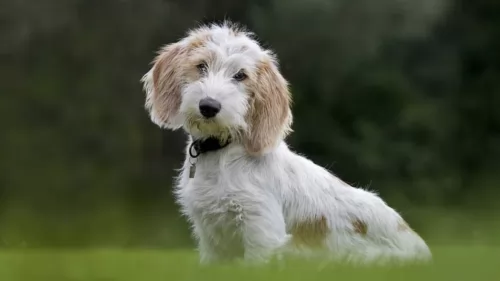 The Petit Basset Griffon Vendéen hails from France. They have always been used to hunt game by scent. This dog has always been appreciated for its independence and the fact that is is mentally focused and fit.
The Petit Basset Griffon Vendéen hails from France. They have always been used to hunt game by scent. This dog has always been appreciated for its independence and the fact that is is mentally focused and fit.
These dogs, referred to as the PBGV descend from the larger Griffon Vendeen, which comes in four distinct sizes. The first official French standard for this dog was published in 1898. It was in 1909 that a revised standard for the dog recognized two distinct varieties.
The first PBGVs were imported to the United States in 1983 and the Petit Basset Griffon Vendeen Club of America was founded in 1984.
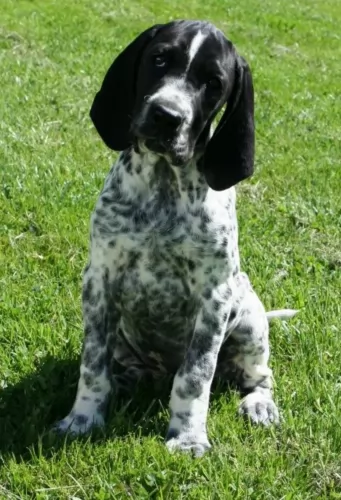 The Braque d’Auvergne is a well built, strong hunting dog with long ears, a large head and a docked tail. His coat is white with black markings and black ears and head. The breed looks a lot like all the other pointing dogs from France. They are medium in stature and has the appearance of a working gundog. He is athletic, muscular and fit. Docking the tail is outlawed in many countries and all of the United Kingdom. In that case the tail is high on the rump and always straight. Their face and head are big for the size of the body and shaped like an oval. With a long muzzle, deep set eyes and a gentle expression, they are kindly and handsome dogs. Their skin is loose but not droopy or wrinkled like hound dogs.
The Braque d’Auvergne is a well built, strong hunting dog with long ears, a large head and a docked tail. His coat is white with black markings and black ears and head. The breed looks a lot like all the other pointing dogs from France. They are medium in stature and has the appearance of a working gundog. He is athletic, muscular and fit. Docking the tail is outlawed in many countries and all of the United Kingdom. In that case the tail is high on the rump and always straight. Their face and head are big for the size of the body and shaped like an oval. With a long muzzle, deep set eyes and a gentle expression, they are kindly and handsome dogs. Their skin is loose but not droopy or wrinkled like hound dogs.
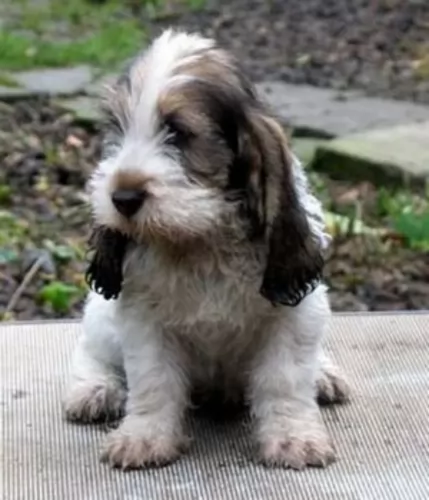 Both male and female dogs are much the same in size, standing at between 32 and 40cm and weighing between 15 to 20 kilograms.
Both male and female dogs are much the same in size, standing at between 32 and 40cm and weighing between 15 to 20 kilograms.
These are solid dogs with fairly short legs and a harsh double coat that is medium length and rough. The coloring is essentially white with patches of orange, lemon, tan or black. The dog has a general tousled appearance with quite a bit of hair around the face. The ears are set low and are floppy while the tail is medium length and held high.
The Petit Basset Griffon Vendeen is a friendly, social, outgoing dog that is good with children and other dogs. He is stubborn and should be trained and socialized so that he is well mannered around people and so that he also obeys simple commands.
They are quite noisy dogs, ‘talking’ to other dogs with a howl and bark.
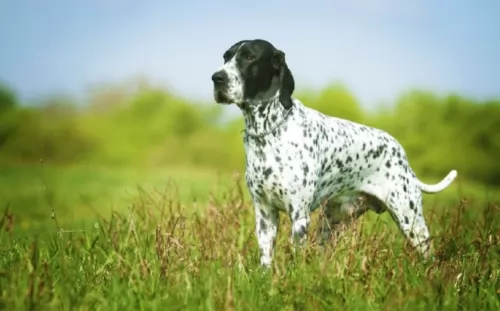 This is a gentle, adaptable and obedient breed. With their intelligence and affectionate nature, they make great family dogs and are eager to please their people. Living with other dogs is fine but not with small, prey size animals. The Braque d’Auvergne should never be left alone pets like gerbils and hamsters. They must be socialized to cats as pets and not prey before living with them successfully. They need to work closely with one human partner. They are first and foremost a hunting dog and need some sort of hunting simulation. They are devoted to their families and want to be constantly in their presence. This can lead to separation anxiety if they are left alone too much. They are great with children and need a family.
This is a gentle, adaptable and obedient breed. With their intelligence and affectionate nature, they make great family dogs and are eager to please their people. Living with other dogs is fine but not with small, prey size animals. The Braque d’Auvergne should never be left alone pets like gerbils and hamsters. They must be socialized to cats as pets and not prey before living with them successfully. They need to work closely with one human partner. They are first and foremost a hunting dog and need some sort of hunting simulation. They are devoted to their families and want to be constantly in their presence. This can lead to separation anxiety if they are left alone too much. They are great with children and need a family.
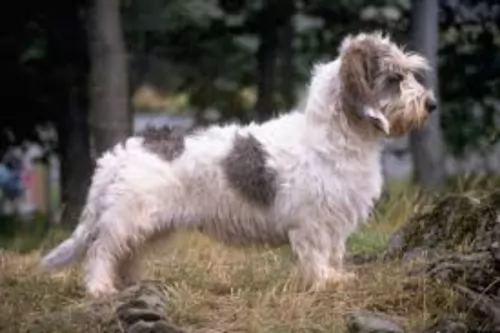 The Petit Basset Griffon Vendéen is known for his amicable characteristics. They’re also intelligent, curious dogs and will respond well to training and socialization.
The Petit Basset Griffon Vendéen is known for his amicable characteristics. They’re also intelligent, curious dogs and will respond well to training and socialization.
Apart from getting on well with children in the home, they also get on well with other dogs. They’re independent and strong willed and can be inclined to bark a bit to make himself known. It is why he is best suited to a home in the suburbs or countryside where his barking won’t disturb close-living neighbors, although training and socialization should change this habit. With training, this dog can become a most wonderful friend and pet.
 The Braque d’Auvergne is a healthy breed but can face some of the same health concerns as other pointers and hunting dogs. The long, droopy ears can get infected easily if wet and need to be cleaned regularly so that food or dirt are not trapped their either. Because of the small gene pool however they may be at risk for several issues. The breeders in France express concerns about possible hip dysplasia and testing is highly recommended. Because they are at risk for other conditions that might not show up until later in life, it is also recommended that they be tested by the Canine Eye Registration Foundation (CERF) as well as the Orthopedic Foundation for Animals (OFA).
The Braque d’Auvergne is a healthy breed but can face some of the same health concerns as other pointers and hunting dogs. The long, droopy ears can get infected easily if wet and need to be cleaned regularly so that food or dirt are not trapped their either. Because of the small gene pool however they may be at risk for several issues. The breeders in France express concerns about possible hip dysplasia and testing is highly recommended. Because they are at risk for other conditions that might not show up until later in life, it is also recommended that they be tested by the Canine Eye Registration Foundation (CERF) as well as the Orthopedic Foundation for Animals (OFA).
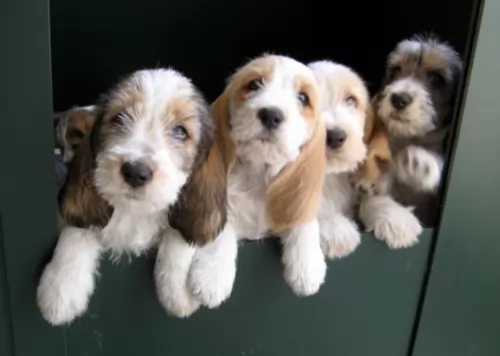 Average longevity of these dogs is about 12, 13, or 14 years if he gets looked after well.
Average longevity of these dogs is about 12, 13, or 14 years if he gets looked after well.
Eyes and joints are always a problem with the Petit and several of the eye diseases dogs get can actually lead to blindness.
Corneal wounds are fairly common in dogs. The cornea can be injured and lacerations can damage the eye. You’ll see your pet rubbing at the affected eye.
Hip joints can cause lameness and pain. Dogs can develop hip and joint problems at any age. Joint problems can be better eliminated by providing the dog with good nutrition and exercise. If your dog is obese, joint problems can be more severe. Weight loss can reduce the signs of joint pain in dogs.
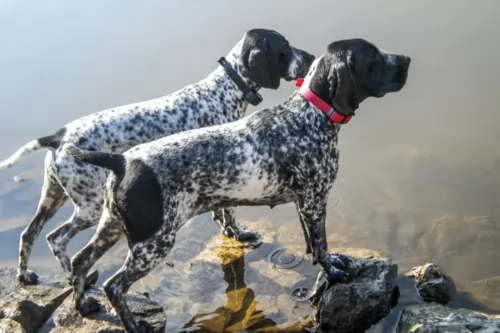 The Braque d’Auvergne needs a high-quality diet fit for a working dog but not too much to make him obese. They are an active breed to choose a formula that is designed for working dogs.
The Braque d’Auvergne needs a high-quality diet fit for a working dog but not too much to make him obese. They are an active breed to choose a formula that is designed for working dogs.
Although no studies have been conducted on the Braque d’Auvergne’s health issues there are many conditions that similar breeds are susceptible to and the d’Auvergne might be as well. This includes any of the following:
This is an active, working dog who needs a lot of stimulation and exercise. The only real appropriate exercise for these dogs is hunting or outings in the woods. He not only needs the exercise, but he also needs to stimulate his sense of smell and his gundog intelligence. He might excel in lure chase or even a form or barn hunt. They certainly could excel at obedience trials and perhaps rally. If you are a weekend hunter then this is the ideal dog for you. They are so easy to train that they surpass other pointers for success with casual hunters. They hunt at a slower pace than many other gundogs. Their intelligence and athleticism lend itself well to agility and flyball also. They need a large (+acres)fenced in area to run and play.
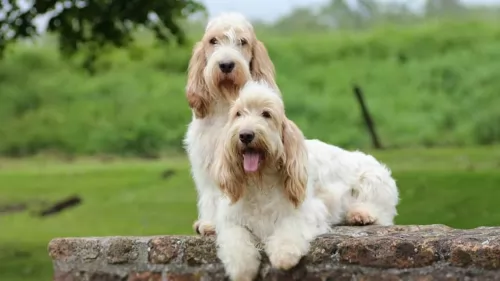 These are active dogs and they will like a daily walk to burn off some of their excess energy. They can adapt to living in the city or the countryside but they will certainly need to receive exercise wherever they are. Buy him some toys and a ball and throw it for him – this can be a wonderful form of exercise for your 4-legged friend.
These are active dogs and they will like a daily walk to burn off some of their excess energy. They can adapt to living in the city or the countryside but they will certainly need to receive exercise wherever they are. Buy him some toys and a ball and throw it for him – this can be a wonderful form of exercise for your 4-legged friend.
They need to be brushed at least twice a week to avoid matting and tangles. Some people opt to have the coat stripped. This is either done by hand or with a special stripping tool. Some dog owners prefer to hand the dog in for a professional cut, but this can alter the texture of the coat.
Because of the floppy ears, they will need regular ear cleanings to prevent ear infections brought about by dirt, wax and moisture within the ear.
He will also need to have his paw nails clipped. He can’t tell you about aching teeth, so do your canine friend a favor and check inside his mouth to ensure that all his teeth are still in tip top condition. Bad teeth can cause all kinds of illnesses and even affect the heart and kidneys.
The nutritional needs of your Petit Basset Griffon Vendeen are very important if your want your pet to enjoy good health.
Vitamins and minerals are an essential part of his nutrition, and luckily the top quality commercially manufactured dog foods see to it that the food has essential nutrients in them. With the best ones, your pet can expect a balanced diet.
Try and avoid the lower quality foods as these have toxic fillers and unhealthy ingredients in them that can make your pet sick.
Give him some home-made food too. You can chop this food up and mix it into his kibble occasionally to give him a healthy tasty treat. The best thing about dogs as pets is that they love their food to be simple and nutritious. Boiled chicken, brown rice or pasta and some healthy vegetables such as spinach, carrots and sweet potato will do him the world of good.
If you can, a little bit of raw meat from time to time can also be excellent for him. Make sure he is never without a bowl of fresh, cool water.